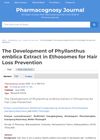 3 citations,
November 2022 in “Experimental dermatology”
3 citations,
November 2022 in “Experimental dermatology” Melatonin may inhibit melanoma growth and has potential as a cancer therapy aid, but its effects on human skin pigmentation need more research.
 3 citations,
June 2020 in “Pharmacognosy Journal”
3 citations,
June 2020 in “Pharmacognosy Journal” Phyllanthus emblica extract in ethosomes could potentially prevent hair loss.
[object Object]  1 citations,
January 2020 in “Indo global journal of pharmaceutical sciences”
1 citations,
January 2020 in “Indo global journal of pharmaceutical sciences” Citrullus colocynthis and Citrullus lanatus have potential health benefits but may also cause reproductive toxicity.

Tiny particles called extracellular vesicles show potential for improving skin health in cosmetics, but more research is needed to confirm their safety and effectiveness.
 73 citations,
July 2016 in “Cosmetics”
73 citations,
July 2016 in “Cosmetics” Mushrooms have beneficial properties for skin and hair care products and have great potential for future cosmetic use.
 2 citations,
January 2011 in “Andrologia”
2 citations,
January 2011 in “Andrologia” Flutamide and a new synthetic steroid affected brain and prostate chemicals and showed potential for treating androgen-related conditions and epilepsy.
 January 2019 in “Springer eBooks”
January 2019 in “Springer eBooks” Modified HDL can better deliver drugs and genes, potentially improving treatments and reducing side effects.
 30 citations,
July 2017 in “BioEssays”
30 citations,
July 2017 in “BioEssays” Activating NRF2 might help treat hair disorders by improving antioxidant defenses.
26 citations,
February 2022 in “Journal of pineal research” Melatonin affects skin and hair color and protects skin cells, with potential benefits for hair growth and skin health.
 37 citations,
January 2019 in “Dermatologic Therapy”
37 citations,
January 2019 in “Dermatologic Therapy” A dietary supplement with Boswellia serrata, Curcuma longa, and Vitis vinifera showed potential improvement in hair health for telogen effluvium patients, but more research is needed.
 3 citations,
November 2020 in “Phyton-international Journal of Experimental Botany”
3 citations,
November 2020 in “Phyton-international Journal of Experimental Botany” Wedelolactone may help treat chronic diseases by acting as an antioxidant and affecting important proteins.
 September 2016 in “Journal of Dermatological Science”
September 2016 in “Journal of Dermatological Science” Golden oyster mushroom extract may protect skin cells from aging by its antioxidant properties.
2 citations,
June 2018 in “Jurnal Penelitian dan Pengembangan Pertanian” Antioxidant-rich maize varieties can improve health and need local support for widespread farming.
[object Object]  January 2025 in “Skin Pharmacology and Physiology”
January 2025 in “Skin Pharmacology and Physiology” Oxidative stress contributes to alopecia areata, suggesting antioxidant treatments might help.
 September 2023 in “Journal of Nutrition and Metabolism”
September 2023 in “Journal of Nutrition and Metabolism” One Ashwagandha extract may help protect cells with its antioxidant properties, while another could promote hair growth.

Red ginseng extract (GS-E3D) may promote hair growth and has antioxidant and anti-inflammatory properties.
 January 2017 in “Korean Journal of Pharmacognosy”
January 2017 in “Korean Journal of Pharmacognosy” Modified red ginseng extract promotes hair growth and has antioxidant and anti-inflammatory effects.
 October 2012 in “Humana Press eBooks”
October 2012 in “Humana Press eBooks” Grape seed extract is good for skin care, with antioxidant, anti-inflammatory, and anti-cancer effects.
1 citations,
March 2009 in “China Journal of Chinese Matera Medica” Procyanidins may have antioxidant, heart health, cancer-fighting, anti-inflammatory, anti-diabetic, liver-protective, and other health benefits with high efficiency and low toxicity.
 85 citations,
March 2012 in “Revista Brasileira de Farmacognosia”
85 citations,
March 2012 in “Revista Brasileira de Farmacognosia” The genus Sophora has compounds with potential health benefits and could lead to new drugs, but more research is needed to understand their effects and safety.
 27 citations,
September 2015 in “PharmaNutrition”
27 citations,
September 2015 in “PharmaNutrition” Astaxanthin is a safe antioxidant that may improve heart, skin, eye health, and physical performance, and help manage chronic diseases.
 24 citations,
January 2014 in “The American Journal of Chinese Medicine”
24 citations,
January 2014 in “The American Journal of Chinese Medicine” The leaves of Platycladus orientalis have potential health benefits but require more research for safety and understanding how they work.
11 citations,
September 2022 in “World Journal of Advanced Pharmaceutical and Medical Research” Nicotiana tabacum has potential therapeutic uses but also poses toxic risks.
June 2023 in “CRC Press eBooks” Acorus calamus has potential health benefits but needs more safety research.
 October 2024 in “International Journal For Multidisciplinary Research”
October 2024 in “International Journal For Multidisciplinary Research” Wedelolactone may help treat chronic diseases due to its strong antioxidant properties.
October 2024 in “International Journal of Biological Macromolecules” Ginkgo biloba leaf polysaccharides have many health benefits and potential for commercial use.
 4 citations,
February 2017 in “Journal of Cutaneous Medicine and Surgery”
4 citations,
February 2017 in “Journal of Cutaneous Medicine and Surgery” Compounds from certain trees used by First Nations people show potential for treating skin conditions and promoting hair growth, but more research is needed to confirm their safety and effectiveness.
 August 2024 in “Plant Signaling & Behavior”
August 2024 in “Plant Signaling & Behavior” OsPRX83 helps rice survive stress by improving stress response and antioxidant activity.
 April 2023 in “Journal of Investigative Dermatology”
April 2023 in “Journal of Investigative Dermatology” SOX2 helps reduce wound size and pressure ulcer formation by suppressing oxidative stress and increasing antioxidant activity in mice.
 October 2022 in “CRC Press eBooks”
October 2022 in “CRC Press eBooks” Cinchona pubescens is a medicinal plant from the Andes with potential health benefits, but more research is needed to fully understand it.
























